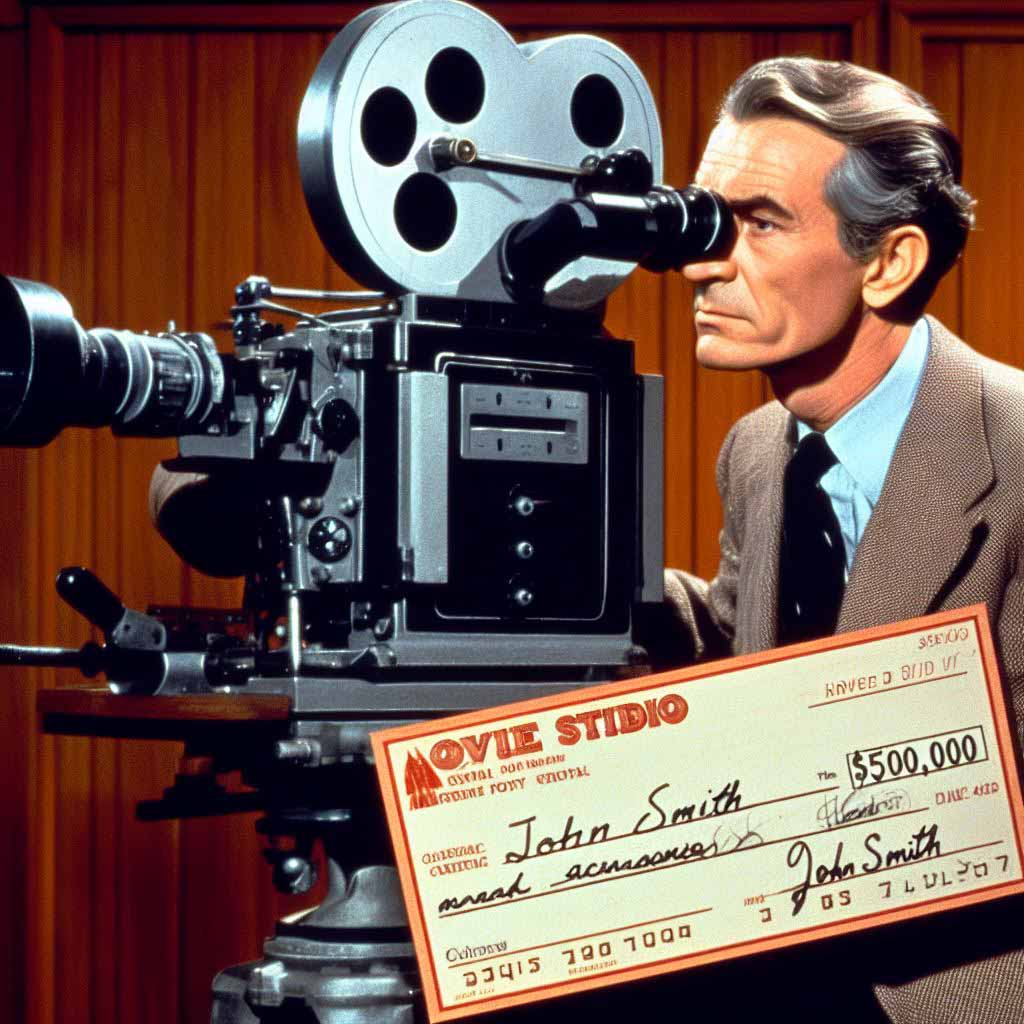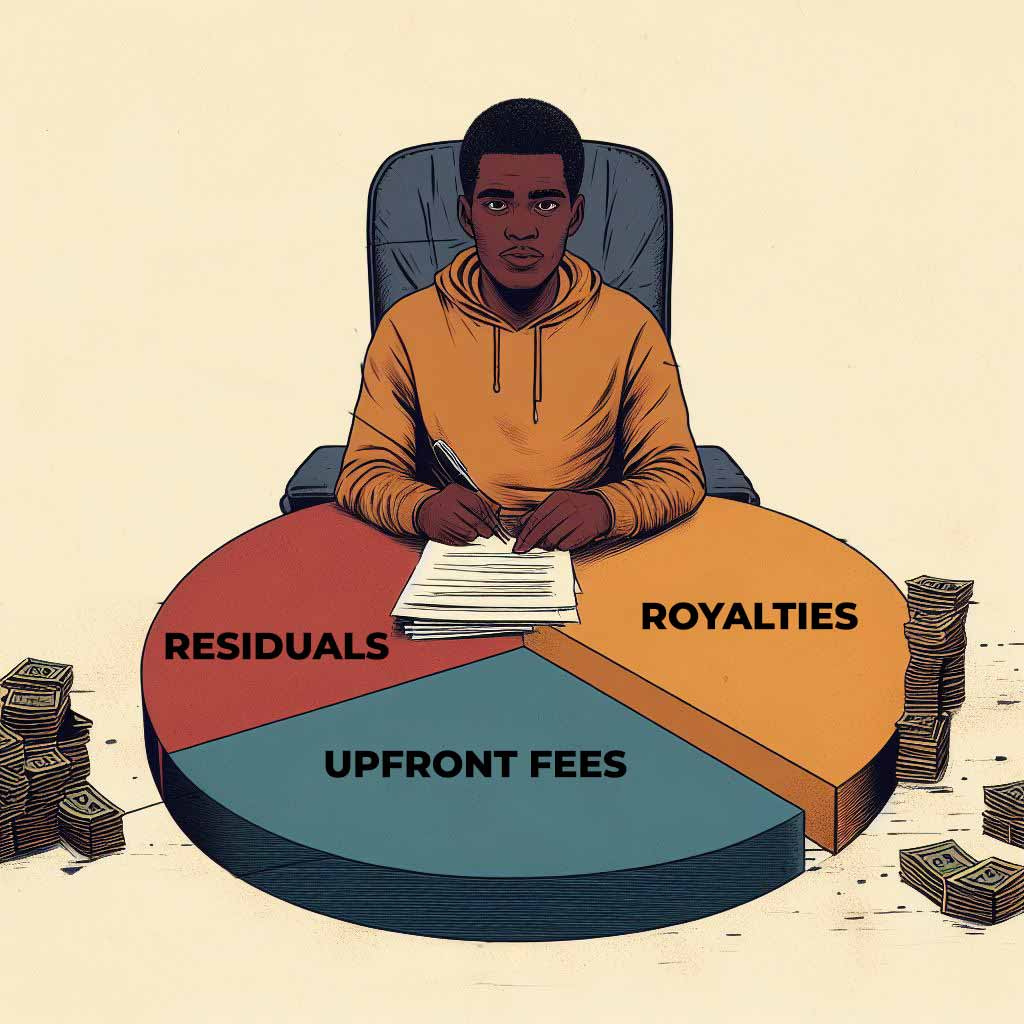If you dream of seeing your name in the coveted “Written By” credit on the big screen, you probably imagine rising fame and fortune. But how do screenwriters actually get paid in Hollywood? Do they receive royalties on successful films and shows?
The reality is complex. While top screenwriters can command million-dollar paydays for spec scripts, compensation models vary widely. Royalties provide important backend income, but eligibility depends on several key factors.
This article breaks down exactly how screenwriters get paid upfront vs. earn royalties over time. You’ll learn how to maximize your profit potential through negotiations, credits, and building leverage in your career.
Let’s dive in.
How Screenwriters Get Paid Upfront
Before a single scene is shot, screenwriters are typically paid an initial lump sum purchase price for their script. According to The Writer’s Guild of America (WGA), here are the minimum prices writers can expect based on the project:

- Original screenplay: $71,500-$133,000
- Adapted screenplay: $61,000-$105,000
- 30-minute TV script: ~$25,000
- 60-minute TV script: ~$42,000
- TV pilot script: ~$27,000 – $69,000
Of course, these figures are just the base negotiation points. Established screenwriters often earn well above the minimums, sometimes into seven-figure territory for high-concept spec scripts. Quentin Tarantino earned over $5 million for his Django Unchained script upfront.

The purchase price is usually paid out in steps, including:
- First payment at pitch approval
- Second payment upon first draft delivery
- Final payment upon studio acceptance of the script
There may be additional weekly rewrite payments during development and production.
The WGA has negotiated mandatory minimums and residual formulas with major studios to protect writers’ incomes. But newer writers have less negotiating power over upfront fees.

Why Royalties Matter for Screenwriters
So screenwriters get an initial payment to write the script – but do they receive any ongoing royalties after that?
Royalties provide backend compensation tied to the success of the produced film or TV show. These extra earnings can be very meaningful.
According to a WGA survey, writer salaries from initial fees only make up around 30% of their total annual compensation. The other 70% comes from residuals, royalties, and fringe benefits.

So while upfront script sale fees put food on the table in the short term, royalties are crucial for long-term career earnings.
They offer three big benefits:
- Provide cash flow as the film or show releases and succeeds.
- Share profits from the screenwriter’s creative work.
- Serve as an incentive to write commercially successful stories.
By contributing to popular, profitable franchises and properties, writers get a slice of the monetary value they help generate beyond the script phase.

When Screenwriters Receive Royalties
But under what circumstances do screenwriters actually earn royalties? And how much can they expect to receive?
Royalty eligibility depends on three key factors:
- Credit
- Production Budget
- Distribution Medium
Let’s break these down.
Credit
Not all credited writers receive royalties. Here are the typical conditions:
- Solo writing credit: 100% royalties
- Shared writing credit: Split royalties with other writing partners
- Story by credit: Generally no royalties
- Non-writing credits like “script consultant”: No royalties
Obtaining sole or shared final credit is critical for the strongest royalty participation.
Production Budget
Royalty rates also vary based on the size and medium of the production:
-
Theatrical Films:
- Budget under $5 million: No royalties
- Budget $5-11 million: Fixed royalty amount
- Budget over $11 million: Percentage royalty on revenue
-
TV shows: Percentage royalty on license fees

On major Hollywood films, common royalty rates under WGA minimums are:
- 0.6% theatrical gross worldwide box office
- 0.8% video/VOD
- 1.2% TV licensing
- 1.5% foreign box office over $70 million
So the bigger the production budget, the bigger the payout potential from percentage-based royalties.
Distribution Medium
Additional royalties can come from:
- DVD / Blu-ray / Video sales
- Streaming platforms (Netflix, Amazon Prime)
- Network rebroadcasts
- International distribution
- Airline entertainment licenses
- Merchandising
- Novelizations or publications
- Performance royalties from music in film/TV

The more distribution channels, the more royalty checks. Theatrical releases lead to the highest royalties. Streaming and foreign distribution are increasingly important.
Maximizing Your Royalty Potential
How can you boost your odds of earning meaningful royalties as a screenwriter beyond upfront script fees?
Here are some key tips:
Write Commercial, Franchise Properties
Aim to sell specs and get hired for well-known adapted properties with built-in audiences. Producers want commercially viable stories. Writing sequels for franchises like Star Wars, Jurassic World or established IPs means your film has a proven track record out of the gate.
Earn Credits on Successful Films
Credits matter, especially for major box office hits. Even a shared credit on a commercial smash like Top Gun: Maverick can be a recurring payday thanks to Hollywood accounting practices. Position yourself to work with brands and scripts that have serious money potential.

Build Negotiating Leverage
The more established you become, the more leverage you have in negotiating upfront and royalty rates. Profitable writers get agents to broker top-dollar deals. Become a hot commodity by showcasing a strong voice through various high-profile projects.
Lobby for Credit Arbitration
Sometimes producers deny proper credits to minimize royalties. Know your rights. Fight for the credits you deserve through official WGA arbitration so you get your fair share of rewards.
Develop a Personal Brand
Extend your influence beyond sold scripts. Boost your profile through social media, directing, producing, podcasts, or published books. A recognized brand name across platforms helps attract opportunities.

The Blueprint to Maximize Your Royalties
To recap, here are the key steps for screenwriters to maximize backend royalties:
- Negotiate the highest upfront script fees possible.
- Earn sole or shared final writing credits on projects big and small. Lobby for credits through arbitration if needed.
- Write commercially proven IPs, franchises, and sequels with built-in audiences.
- Build relationships with successful producers who invest in profitable projects.
- Develop a respected personal brand and industry leverage beyond sold scripts.
- Understand royalty rates across distribution channels based on budget tiers.
- Consult a knowledgeable entertainment lawyer to review all contracts.
- Track detailed records of projects and royalty payments through organizations like the WGA.
- Exploit subsidiary royalty sources like novelizations, soundtracks, merchandise, etc.
- Maximize distribution reach for each project to accumulate royalties.
Following these best practices gives you the optimal shot at transforming your passion into long-term screenwriting success, financial security, and creative fulfillment.

The Takeaway
While initial script sale fees provide short-term income, ongoing royalties are the key to profitable screenwriting over decades-long careers. Major credits on commercially successful productions, plus diversified distribution, are essential to royalty generation. Write for passion, but negotiate for fair compensation.
Understanding Hollywood finances allows writers to earn their creative and monetary worth. There are no guarantees, but the right strategies position you to profit from your storytelling gifts.
So sharpen those skills, develop that compelling voice, and go tell your stories on screens worldwide. Here’s to a royalty-rich screenwriting journey ahead. Let us know if you have any other questions!
Frequently Asked Questions
Do script writers get paid royalties?
Yes, screenwriters who receive sole or shared final writing credit are eligible for royalties based on the success of a film or TV production. Royalty rates vary based on factors like budget size and distribution medium.
What percentage of profits do screenwriters get?
For major studio films, screenwriters typically get around 0.3% to 2% of net profits based on factors like box office gross, home video sales, etc. High-budget franchises can result in millions.
Do script writers get residuals?
Yes, residuals are a form of royalties paid to writers when TV episodes or films are re-aired or distributed on secondary platforms like streaming.
How much do scriptwriters get paid?
It varies widely, but the WGA minimum for an original feature film script is $71,500. Established writers earn over $1 million for studio projects. TV pays per episode with minimums of ~$25k-$69k.
How much does Netflix pay for scripts?
For new series, Netflix pays around $75k-$250k per episode depending on the writer’s experience level. Original features generally start at $300k.
Who is the highest-paid screenwriter in the world?
Akiva Goldsman reportedly earned $8 million for writing The Da Vinci Code, making him one of the highest paid at the time. Other top earners include Robert Towne, Shane Black, and Scott Rosenberg.
How much do first-time screenplays sell for?
Unknown first-time screenwriters typically get $5,000-$30,000 for their first script sale. The WGA minimum for a new writer is $71,500 but hard to get without experience.
Do screenwriters get paid monthly?
No, screenwriters usually get an initial lump sum payment upon selling their script, then residuals at later points when the film or show releases and airs. They do not receive monthly payments.
How do I sell my screenplay to Netflix?
You can contact Netflix Creative Executives directly to submit scripts. But breaking into major studios as an unknown is difficult without a producer or agent. Producing sought-after, high-quality scripts increases your odds.

